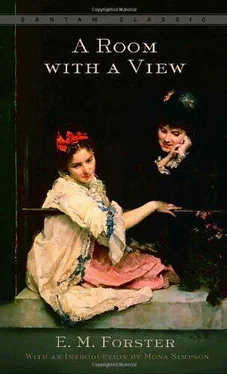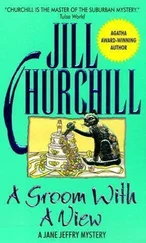Edward Forster - A Room with a View
Здесь есть возможность читать онлайн «Edward Forster - A Room with a View» весь текст электронной книги совершенно бесплатно (целиком полную версию без сокращений). В некоторых случаях можно слушать аудио, скачать через торрент в формате fb2 и присутствует краткое содержание. Жанр: Классическая проза, на английском языке. Описание произведения, (предисловие) а так же отзывы посетителей доступны на портале библиотеки ЛибКат.
- Название:A Room with a View
- Автор:
- Жанр:
- Год:неизвестен
- ISBN:нет данных
- Рейтинг книги:4 / 5. Голосов: 1
-
Избранное:Добавить в избранное
- Отзывы:
-
Ваша оценка:
- 80
- 1
- 2
- 3
- 4
- 5
A Room with a View: краткое содержание, описание и аннотация
Предлагаем к чтению аннотацию, описание, краткое содержание или предисловие (зависит от того, что написал сам автор книги «A Room with a View»). Если вы не нашли необходимую информацию о книге — напишите в комментариях, мы постараемся отыскать её.
A Room with a View — читать онлайн бесплатно полную книгу (весь текст) целиком
Ниже представлен текст книги, разбитый по страницам. Система сохранения места последней прочитанной страницы, позволяет с удобством читать онлайн бесплатно книгу «A Room with a View», без необходимости каждый раз заново искать на чём Вы остановились. Поставьте закладку, и сможете в любой момент перейти на страницу, на которой закончили чтение.
Интервал:
Закладка:
"Since Florence did my poor sister so much good," wrote Miss Catharine, "we do not see why we should not try Athens this winter. Of course, Athens is a plunge, and the doctor has ordered her special digestive bread; but, after all, we can take that with us, and it is only getting first into a steamer and then into a train. But is there an English Church?" And the letter went on to say: "I do not expect we shall go any further than Athens, but if you knew of a really comfortable pension at Constantinople, we should be so grateful."
Lucy would enjoy this letter, and the smile with which Mr. Beebe greeted Windy Corner was partly for her. She would see the fun of it, and some of its beauty, for she must see some beauty. Though she was hopeless about pictures, and though she dressed so unevenly—oh, that cerise frock yesterday at church!—she must see some beauty in life, or she could not play the piano as she did. He had a theory that musicians are incredibly complex, and know far less than other artists what they want and what they are; that they puzzle themselves as well as their friends; that their psychology is a modern development, and has not yet been understood. This theory, had he known it, had possibly just been illustrated by facts. Ignorant of the events of yesterday he was only riding over to get some tea, to see his niece, and to observe whether Miss Honeychurch saw anything beautiful in the desire of two old ladies to visit Athens.
A carriage was drawn up outside Windy Corner, and just as he caught sight of the house it started, bowled up the drive, and stopped abruptly when it reached the main road. Therefore it must be the horse, who always expected people to walk up the hill in case they tired him. The door opened obediently, and two men emerged, whom Mr. Beebe recognized as Cecil and Freddy. They were an odd couple to go driving; but he saw a trunk beside the coachman's legs. Cecil, who wore a bowler, must be going away, while Freddy (a cap)—was seeing him to the station. They walked rapidly, taking the short cuts, and reached the summit while the carriage was still pursuing the windings of the road.
They shook hands with the clergyman, but did not speak.
"So you're off for a minute, Mr. Vyse?" he asked.
Cecil said, "Yes," while Freddy edged away.
"I was coming to show you this delightful letter from those friends of Miss Honeychurch." He quoted from it. "Isn't it wonderful? Isn't it romance? most certainly they will go to Constantinople. They are taken in a snare that cannot fail. They will end by going round the world."
Cecil listened civilly, and said he was sure that Lucy would be amused and interested.
"Isn't Romance capricious! I never notice it in you young people; you do nothing but play lawn tennis, and say that romance is dead, while the Miss Alans are struggling with all the weapons of propriety against the terrible thing. 'A really comfortable pension at Constantinople!' So they call it out of decency, but in their hearts they want a pension with magic windows opening on the foam of perilous seas in fairyland forlorn! No ordinary view will content the Miss Alans. They want the Pension Keats."
"I'm awfully sorry to interrupt, Mr. Beebe," said Freddy, "but have you any matches?"
"I have," said Cecil, and it did not escape Mr. Beebe's notice that he spoke to the boy more kindly.
"You have never met these Miss Alans, have you, Mr. Vyse?"
"Never."
"Then you don't see the wonder of this Greek visit. I haven't been to Greece myself, and don't mean to go, and I can't imagine any of my friends going. It is altogether too big for our little lot. Don't you think so? Italy is just about as much as we can manage. Italy is heroic, but Greece is godlike or devilish—I am not sure which, and in either case absolutely out of our suburban focus. All right, Freddy—I am not being clever, upon my word I am not—I took the idea from another fellow; and give me those matches when you've done with them." He lit a cigarette, and went on talking to the two young men. "I was saying, if our poor little Cockney lives must have a background, let it be Italian. Big enough in all conscience. The ceiling of the Sistine Chapel for me. There the contrast is just as much as I can realize. But not the Parthenon, not the frieze of Phidias at any price; and here comes the victoria."
"You're quite right," said Cecil. "Greece is not for our little lot"; and he got in. Freddy followed, nodding to the clergyman, whom he trusted not to be pulling one's leg, really. And before they had gone a dozen yards he jumped out, and came running back for Vyse's match-box, which had not been returned. As he took it, he said: "I'm so glad you only talked about books. Cecil's hard hit. Lucy won't marry him. If you'd gone on about her, as you did about them, he might have broken down."
"But when—"
"Late last night. I must go."
"Perhaps they won't want me down there."
"No—go on. Good-bye."
"Thank goodness!" exclaimed Mr. Beebe to himself, and struck the saddle of his bicycle approvingly, "It was the one foolish thing she ever did. Oh, what a glorious riddance!" And, after a little thought, he negotiated the slope into Windy Corner, light of heart. The house was again as it ought to be—cut off forever from Cecil's pretentious world.
He would find Miss Minnie down in the garden.
In the drawing-room Lucy was tinkling at a Mozart Sonata. He hesitated a moment, but went down the garden as requested. There he found a mournful company. It was a blustering day, and the wind had taken and broken the dahlias. Mrs. Honeychurch, who looked cross, was tying them up, while Miss Bartlett, unsuitably dressed, impeded her with offers of assistance. At a little distance stood Minnie and the "garden-child," a minute importation, each holding either end of a long piece of bass.
"Oh, how do you do, Mr. Beebe? Gracious what a mess everything is! Look at my scarlet pompons, and the wind blowing your skirts about, and the ground so hard that not a prop will stick in, and then the carriage having to go out, when I had counted on having Powell, who—give every one their due—does tie up dahlias properly."
Evidently Mrs. Honeychurch was shattered.
"How do you do?" said Miss Bartlett, with a meaning glance, as though conveying that more than dahlias had been broken off by the autumn gales.
"Here, Lennie, the bass," cried Mrs. Honeychurch. The garden-child, who did not know what bass was, stood rooted to the path with horror. Minnie slipped to her uncle and whispered that every one was very disagreeable to-day, and that it was not her fault if dahlia-strings would tear longways instead of across.
"Come for a walk with me," he told her. "You have worried them as much as they can stand. Mrs. Honeychurch, I only called in aimlessly. I shall take her up to tea at the Beehive Tavern, if I may."
"Oh, must you? Yes do.—Not the scissors, thank you, Charlotte, when both my hands are full already—I'm perfectly certain that the orange cactus will go before I can get to it."
Mr. Beebe, who was an adept at relieving situations, invited Miss Bartlett to accompany them to this mild festivity.
"Yes, Charlotte, I don't want you—do go; there's nothing to stop about for, either in the house or out of it."
Miss Bartlett said that her duty lay in the dahlia bed, but when she had exasperated every one, except Minnie, by a refusal, she turned round and exasperated Minnie by an acceptance. As they walked up the garden, the orange cactus fell, and Mr. Beebe's last vision was of the garden-child clasping it like a lover, his dark head buried in a wealth of blossom.
"It is terrible, this havoc among the flowers," he remarked.
"It is always terrible when the promise of months is destroyed in a moment," enunciated Miss Bartlett.
Читать дальшеИнтервал:
Закладка:
Похожие книги на «A Room with a View»
Представляем Вашему вниманию похожие книги на «A Room with a View» списком для выбора. Мы отобрали схожую по названию и смыслу литературу в надежде предоставить читателям больше вариантов отыскать новые, интересные, ещё непрочитанные произведения.
Обсуждение, отзывы о книге «A Room with a View» и просто собственные мнения читателей. Оставьте ваши комментарии, напишите, что Вы думаете о произведении, его смысле или главных героях. Укажите что конкретно понравилось, а что нет, и почему Вы так считаете.












